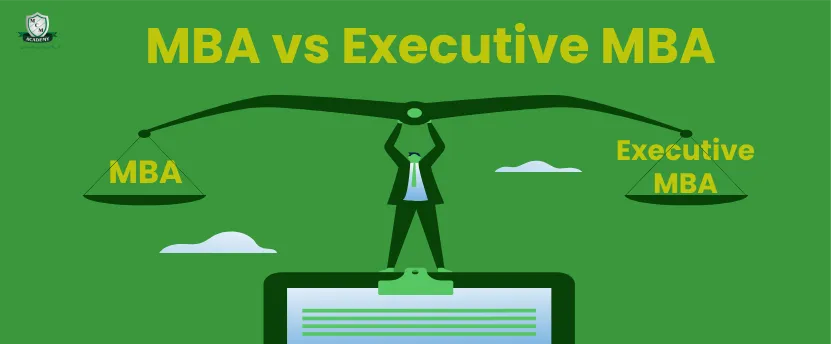In today’s fast-paced and competitive business landscape, climbing the corporate ladder and unlocking the path to success requires more than just ambition and hard work. It demands a strategic approach, a deep understanding of business principles, and the right educational credentials to back it up. That’s where the dilemma begins: Should you pursue a traditional MBA or an Executive MBA (EMBA) to propel your career forward? We understand that choosing between the two can be overwhelming, as they both offer unique benefits and cater to different career goals. In this comprehensive guide, we will delve into the key differences between an MBA and an EMBA, helping you make an informed decision that aligns with your aspirations and aspirations.
Understanding the MBA: A Comprehensive Overview
MBA programs offer a comprehensive overview of business management, equipping students with the skills needed to excel in the corporate world. An MBA provides a broad understanding of various business disciplines such as finance, marketing, operations, and entrepreneurship.
Exploring the Benefits of an MBA Program
- An MBA program offers a multitude of benefits to individuals seeking to boost their careers. It equips students with essential business skills, such as leadership, strategic thinking, and problem-solving.
- Additionally, an MBA provides a valuable network of contacts, allowing for professional growth and opportunities. Furthermore, graduates of an MBA program often enjoy higher salaries and better job prospects.
- An MBA program typically covers a wide range of business disciplines, including finance, marketing, operations, and strategy.
Understanding the Executive MBA: A Comprehensive Overview
Executive MBA, or EMBA, is a specialized MBA program designed for experienced professionals who want to enhance their leadership skills and advance their careers. Unlike a traditional MBA, which is often pursued by individuals without significant work experience, an EMBA is tailored for mid-career professionals who are already in managerial or executive roles. The program typically includes advanced courses in leadership, strategy, finance, and marketing, providing students with the knowledge and skills necessary to excel in high-level positions. With its focus on practical application and real-world experience, an EMBA is an excellent choice for professionals looking to accelerate their career growth and make a lasting impact in the business world.
The Benefits of Pursuing an EMBA for Experienced Professionals
An Executive Master of Business Administration (EMBA) offers numerous benefits for experienced professionals. Unlike a traditional MBA, an EMBA is specifically designed for those who already have a substantial amount of work experience and are looking to enhance their leadership skills.
- One major advantage of pursuing an EMBA is the opportunity to network with other high-level professionals in your industry. This can lead to valuable connections and potential career advancement.
- Additionally, an EMBA program typically allows for flexible scheduling, making it easier to balance work and study commitments. By pursuing an EMBA, experienced professionals can gain new insights, expand their knowledge base, and ultimately position themselves for greater success in their careers.
Analyzing the Curriculum and Structure of an EMBA Program
When it comes to analyzing the curriculum and structure of an EMBA program, there are several key factors to consider. An EMBA program, or Executive MBA, is specifically designed for experienced professionals who want to further develop their leadership and management skills. Unlike a traditional MBA, an EMBA program typically requires several years of work experience for admission. The curriculum of an EMBA program often focuses on advanced business concepts, strategic thinking, and leadership development. It may also include specialized courses in areas such as finance, marketing, and entrepreneurship. The structure of an EMBA program is usually part-time, allowing students to continue working while they study. This flexibility is especially beneficial for executives who are juggling multiple responsibilities. Overall, an EMBA program provides a unique learning experience tailored to the needs of seasoned professionals looking to enhance their career prospects and take on higher-level leadership roles. So, if you’re considering pursuing an EMBA, carefully analyzing the curriculum and structure of the program is essential to ensure it aligns with your goals and aspirations.
The Key Differences Between an MBA and an EMBA
An MBA (Master of Business Administration) and an EMBA (Executive MBA) are two distinct programs that cater to different professionals at different stages of their careers. While both programs provide advanced business knowledge and skills, they differ in various aspects.
- An MBA is typically pursued by individuals who are early in their career or seeking a career change. It offers a comprehensive curriculum that covers various business disciplines such as finance, marketing, and operations. On the other hand, an EMBA is designed for experienced professionals who are already in leadership positions. It focuses on enhancing managerial skills and strategic thinking, with a curriculum tailored to the needs of executives.
- Another key difference is the class format. MBA programs are often full-time or part-time, allowing students to dedicate their time solely to academics. EMBA programs, on the other hand, are usually structured as part-time programs, enabling working professionals to balance their job responsibilities while pursuing the degree.
- Moreover, the networking opportunities differ between the two programs. MBA programs attract a diverse group of students from various industries and backgrounds, providing ample networking opportunities. EMBA programs, on the other hand, bring together seasoned professionals from similar backgrounds, allowing for more targeted networking within specific industries or sectors.
- In terms of admissions requirements, EMBA programs typically require a higher level of work experience compared to MBA programs. This is because EMBA programs are tailored for individuals in higher management positions who can bring real-world experience to the classroom.
Weighing the Cost and Return on Investment (ROI) of an MBA vs EMBA
When considering pursuing higher education in business administration, it is essential to weigh the cost and return on investment (ROI) of an MBA versus an EMBA. Both programs offer valuable skills and knowledge, but they cater to different needs. An MBA is typically a full-time program, that provides a comprehensive business education, while an EMBA is designed for experienced professionals seeking to enhance their leadership abilities while working. The cost of an MBA can be substantial, with tuition fees, living expenses, and opportunity costs to consider. On the other hand, an EMBA allows professionals to continue working while pursuing their degree, minimizing the impact on their income. Ultimately, the decision between an MBA and an EMBA depends on individual circumstances, career goals, and financial considerations.
Making an Informed Decision: Factors to Consider
When considering whether to pursue an MBA or an Executive MBA (EMBA), there are several factors to take into account.
- Firstly, evaluate your career goals and aspirations. An MBA offers a comprehensive business education for individuals seeking to advance or switch careers, while an EMBA is designed for experienced professionals looking to enhance their leadership skills.
- Secondly, consider your time commitment. An MBA program typically requires full-time study, whereas an EMBA program is designed for working professionals and offers a more flexible schedule.
- Additionally, think about your networking opportunities. Both programs provide valuable connections, but an MBA often offers a larger and more diverse alumni network.
- Finally, weigh the financial aspect. An MBA can be a significant investment, while an EMBA may be more cost-effective as it allows professionals to continue working while pursuing their degree. By carefully considering these factors, you can make an informed decision that aligns with your career goals and lifestyle.
Conclusion: Choosing the Right Path to Success
The choice between an Executive MBA (EMBA) and a traditional MBA depends on individual career goals, work experience, and personal circumstances. An MBA is typically pursued by individuals early in their careers, offering a comprehensive curriculum and networking opportunities. It’s an ideal choice for those looking to make a career pivot or accelerate their progression in the business world. On the other hand, an EMBA caters to seasoned professionals with substantial work experience, often requiring applicants to have managerial roles. EMBA programs are designed to accommodate the schedules of working executives, with classes held on weekends or in modular formats. The EMBA emphasises the application of knowledge within the context of a student’s current professional role. Both programs offer unique advantages, with the MBA suited for early-career professionals seeking foundational skills, and the EMBA tailored for mid-to-senior level executives aiming to enhance leadership abilities and strategic thinking while continuing to work. Ultimately, the “better” choice depends on one’s career stage and objectives.























